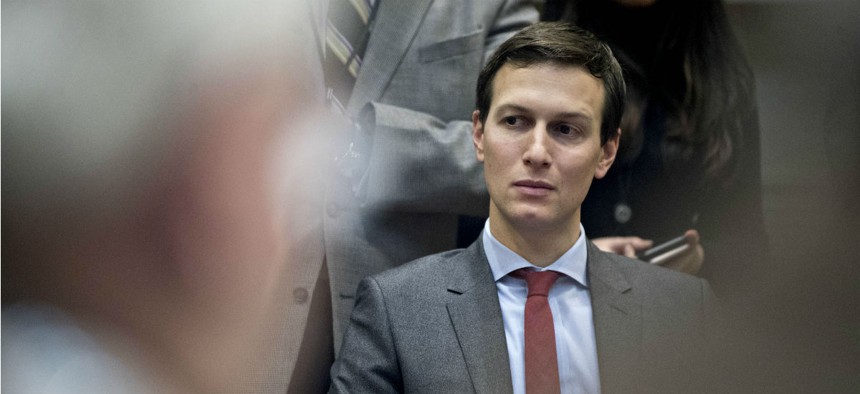
Senior White House adviser Jared Kushner. Andrew Harrer/Pool via CNP/MediaPunch/IPX
Jared Kushner’s Conflict of Interest Issues
President Trump’s son-in-law and key adviser has a ways to go on ethics compliance.
As a White House adviser with a broad portfolio, presidential son-in-law Jared Kushner is required to comply with federal law forbidding employees from profiting from endeavors affected by government decisions in which they participate.
Hence, beginning in December, Kushner—a wealthy real estate owner and investor married to Ivanka Trump—and his attorneys began negotiating ethics agreements, beginning with a Justice Department Office of Legal Counsel ruling that the nepotism law did not disqualify him from the White House post to which he was named on Jan. 9.
After Kushner, 35, and his wife moved from New York City to Washington, bought a home and set their children up in new schools, his attorney Jamie Gorelick announced that he would divest himself from ownership interests in New York real estate and investment firms and foreign holdings. Kushner will “recuse [himself] from particular matters that would have a direct and predictable effect on his remaining financial interests,’’ Gorelick said.
But some observers remained skeptical that all conflicts would be removed. On Jan. 7, the New York Times reported, Kushner was nearing a deal with a Chinese insurance company—indeed, the top Chinese diplomatic envoy visited Trump on Monday in the expectation of a full visit from President Xi Jinping.
Last Friday, ProPublica, the nonprofit investigative news organization, published the results of its investigation of Kushner using Office of Government Ethics documents to conclude that Kushner is “keeping parts of his family business.” Reporters cited an email from the White House saying he would keep an undetermined portion of what he owned in shares in Kushner Companies, 35 investments in all.
ProPublica obtained a copy of one certificate of divesture signed by David Apol, general counsel of the Office of Government Ethics, listing as an attachment statements that Kushner had unloaded “100 percent of all financial interests” in such companies as JKM Capital, Thrive Partners, Broadband Proliferation Partners and Regal Bank. (The White House is behind on posting ethics pledge-waivers on its public website, which is blank.)
For incoming federal officials, selling off large assets is complicated by market conditions—Kushner has said the process would cost him—but also by legal paperwork.
Government Executive, using the Freedom of Information Act, obtained one heretofore unpublished Jan. 6 letter from OGE Director Walter Shaub to another of Kushner’s attorneys, Edward Siskel of Wilmer, Cutler, Pickering, Hale and Dorr.
Though it redacted a summary of the attorney’s own letter of Dec. 28, Shaub’s letter instructs that “with regard to each entity in which he holds an interest, Mr. Kushner must not participate personally and substantially in any particular matter that to his knowledge has a direct and predictable effect on the financial interests of the entity until he has divested it.” The only exceptions are if Kushner first obtains a written waiver or qualifies for a regulatory exemption.
Perhaps adding to the complexity, Shaub continued to say that if Kushner intends to seek a certificate of divestiture from OGE, “he will need to obtain the certificate of divestiture before selling his assets.”
Though Kushner is not a presidential nominee like a Cabinet member, this guidance generally applies, Shaub said, “but OGE’s guidance is limited” because his staff doesn’t know the duties Kushner will be performing. The ethics chief urged Kushner to talk to White House counsel.







